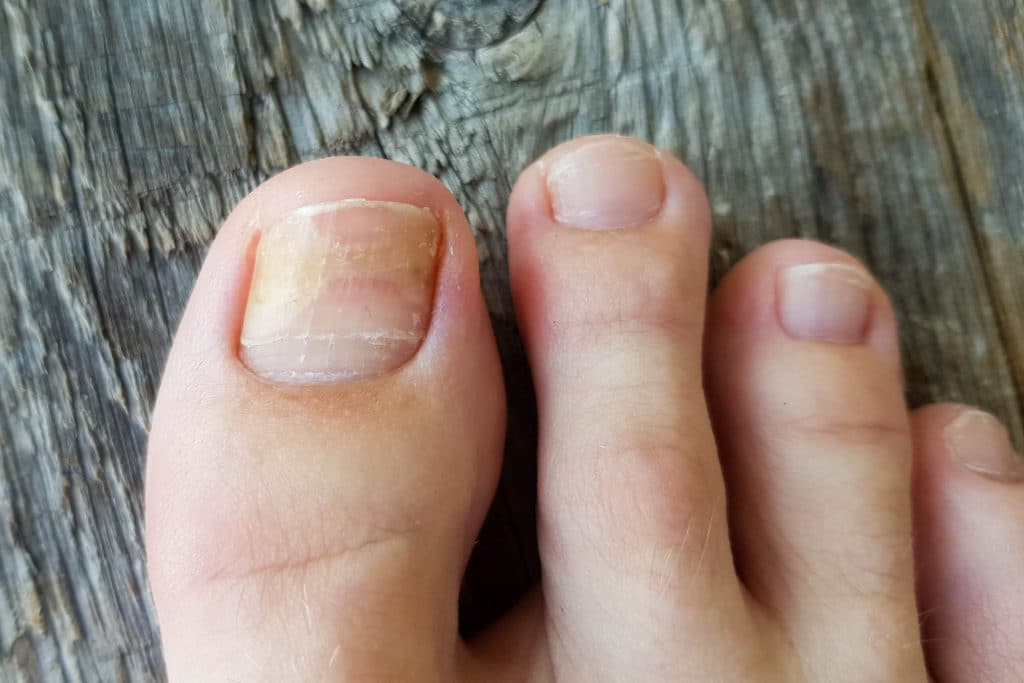Fungal nail infection (onychomycosis) is a common condition that affects millions of people worldwide. It can be difficult to treat, and traditional methods such as topical creams or oral medications may not always be effective. In recent years, laser treatment has emerged as an alternative option for managing fungal nail infections. One of the advanced technologies used in laser treatments includes the Lunula Laser, known for its effectiveness in targeting fungal infections.
Here at Waverley Clinic, we offer a comprehensive range of fungal nail laser treatments (including Lunula Laser and K-Laser) to suit the individual needs of our patients. In this article, we will explore the different options available for fungal nail laser treatment.
What is toenail fungus?
Toenail fungus is a type of infection that occurs when fungi (such as dermatophyte) invade the nails. It typically starts as a white or yellow spot under the tip of your toenail and can spread deeper, causing discolouration, thickening, and crumbling of the nail. Fungal nail infections are more common in toenails than fingernails because toes are often confined in warm, moist environments – making it easier for fungi to thrive.
Is a fungal nail infection common?
Yes, fungal nail infections are relatively common. In fact, it is estimated that they account for about half of all nail diseases. Although anyone can get a fungal nail infection, certain factors increase the risk of developing one. These include old age, diabetes, a weakened immune system, heavy perspiration and frequent exposure to moist environments (such as public swimming pools and showers).
What causes fungal nail infections?
Fungal nail infections are caused by different types of fungi, although dermatophyte is the most common culprit. These fungal spores typically thrive in warm and moist environments, making it easy for them to spread from person to person or from object to person (such as through shared towels or shoes). Poor hygiene, minor skin injuries, and wearing tight-fitting footwear can also increase the risk of developing a fungal nail infection on the nail plate.
What are the main symptoms of fungal nail infection?
Some of the main common symptoms of fungal growth and nail fungus infection include:
● Discolouration of the nail (usually white, yellow, or brown)
● Thickened nails
● Nail abnormalities
● Brittle or crumbly nails
● Debris buildup under the nail
● A foul odour coming from the infected nail
● Pain or discomfort in the affected area
If left untreated, fungal nail infections can become more severe and may even cause permanent damage to the nails.
How do you treat fungal nail infections?
Traditionally, fungal nail infections have been treated with topical creams or oral medications. However, these methods may not always be effective and can take a long time to see results. In recent years, laser nail treatment, including the use of K-Laser, has emerged as an alternative option for managing nail fungus infections.
Longterm treatment of toenail fungus
Fungal laser nail treatment is a relatively new method for treating toenail fungus that has shown promising results. The procedure involves using a laser light to target and destroy the fungal infection, while leaving healthy tissue unharmed. It works by penetrating through the nail and targeting the fungi directly, rather than just on the surface.
The Lunula ‘cold’ Laser is one of the advanced technologies used in this procedure, known for its ability to effectively target and destroy fungal infections.
One of the main advantages of fungal laser nail treatment is that it is a non-invasive procedure, meaning there is no need for anaesthesia or incisions. This also means that there is little to no downtime, and patients can immediately resume their normal activities after the treatment. Typically, multiple sessions are needed for optimal results.
How does laser toenail fungus treatment work?
During the laser for nail fungus treatment, including the use of the K-Laser, a concentrated beam of light is directed at the infected fungal toenail and surrounding skin. The light energy from the laser is absorbed by the fungi, causing them to heat up and ultimately die off. This process does not harm the nail bed or healthy tissue around the infection and has been proven to be an effective method for treating a toenail fungus infection.
World-leading treatment for fungal nail infection
At Waverley Clinic, we offer two types of laser treatment to treat fungal nail infections: the K-Laser and the Lunula Laser. These are FDA-approved and have been shown to be highly effective in treating toenail fungus.
The leading provider of fungal nail laser treatment in Farnham
Waverley Clinic is a leading provider of fungal nail laser treatment in Farnham. Our team of experienced professionals are dedicated to providing the best possible care for our patients and have extensive knowledge and training in using laser technology for treating toenail fungus. We understand that every patient is unique, which is why we offer personalised treatment plans to suit individual needs.
Having suffered from a nail infection and cracked heels for years I’m blown away with the level of service and results I have already seen after just ‘2 treatments’. I can’t recommend Jonathan enough. Not only am I seeing results, but the whole team is a pleasure to deal with. I would give a 10 star review if I could.
Reece – Farnham
K-laser or Lunula ‘cold’ Laser Therapy at Waverley Clinic
The K-Laser is a high-power laser that uses special wavelengths to target and destroy fungal infections on and around the nail bed. It has been proven to be highly effective in treating fungal nails, with visible results seen after just one treatment.
The Lunula Laser, on the other hand, uses low-level cold laser therapy to stimulate the body’s natural immune response and help fight off the fungal infection on infected nails. Both methods are painless and require no downtime, making them a popular choice for many patients.
Quick and painless treatment
One of the main advantages of laser treatment for fungal nail infections is that it is quick and painless. Unlike traditional methods, which can take months to see results, patients often notice improvements after just one session with the K-Laser or Lunula Laser.
How much does fungal nail treatment cost?
The cost of fungal nail treatment can vary depending on the severity of the infection and the type of laser used. At Waverley Clinic, we offer competitive prices for both K-Laser and Lunula Laser treatments.
To book a fungal nail assessment and discuss treatment options, please call Waverley Clinic at 01252 716611.
Can laser treatment be used on fingernails?
Yes, laser treatment can also be used to treat fungal infections on fingernails. The same technology and methods used for treating toenail fungus can also be applied to fingernail infections. However, it is important to note that results may vary depending on the severity of the infection and individual response to treatment.
How can Lunula and K-Laser treatment cure fungal toenails?
Laser treatment for fungal toenails works by targeting and destroying the fungus responsible for the infection. The high-power wavelengths of the K-Laser and low-level cold laser therapy of the Lunula Laser penetrate through the nail, reaching the source of the infection and effectively killing it off. This allows for healthy new nail growth to occur, resulting in a cure for fungal toenails.
How many treatments are required?
The number of treatments required for laser treatment of fungal toenails can vary depending on the severity of the foot fungus infection and individual response to treatment. Typically, multiple sessions are needed for optimal results. During your initial consultation, our team will assess your condition and provide a personalised treatment plan tailored to your needs.
How long does it take to see improvements?
While results may vary, many patients notice improvements after just one or two sessions with the K-Laser or Lunula Laser. This is much quicker compared to traditional methods that can take months to see any visible changes. The duration of treatment will depend on the severity of the infection and individual response to treatment.
What do I need to do to prepare for nail laser treatment?
There is no specific preparation required for laser treatment of fungal toenails. However, it is recommended to keep the nails clean and trimmed before the procedure. It is also important to inform your podiatrist about your medical history and any medications or supplements you are taking, as they may interfere with the laser treatment.
What can I do to reduce the risk of reinfection?
To reduce the risk of reinfection, it is important to maintain good foot hygiene and nail care. Take preventative measures such as wearing clean socks and shoes, avoid walking barefoot in public places, and keeping your nails trimmed. It may also be beneficial to use anti-fungal creams or sprays on a regular basis.
Conclusion: book your Lunula or K-Laser fungal nail therapy with Waverley Clinic today!
Don’t let a fungal nail infection stop you from wearing open-toed shoes or make you feel self-conscious about the appearance of your nails.
Contact Waverley Clinic today at 01252 716611 to book an assessment and find out if laser treatment for fungal toenails is right for you. Our experienced professionals will guide you through the process and provide personalised treatment plans to help you achieve healthy, clear nails once again.
So why wait? Book your appointment today and take the first step towards healthier, happier feet.

